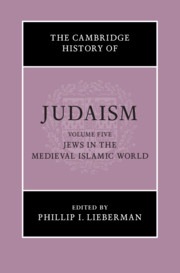Book contents
- The Cambridge History of Judaism
- The Cambridge History of Judaism
- The Cambridge History of Judaism
- Copyright page
- Contents
- Figures
- Acknowledgments
- Introduction
- Part I Jews in the Medieval Islamic World
- Part II Social and Institutional History
- Chapter 11 Demography and Migrations
- Chapter 12 Economic Activities
- Chapter 13 Jewish Religious and Communal Organization
- Chapter 14 Schools and Education
- Chapter 15 The Life Cycle and the Annual Cycle in Genizah Society
- Chapter 16 Family Life in Genizah Society
- Part III Spiritual and Intellectual History
- Index
- References
Chapter 16 - Family Life in Genizah Society
from Part II - Social and Institutional History
Published online by Cambridge University Press: 21 August 2021
- The Cambridge History of Judaism
- The Cambridge History of Judaism
- The Cambridge History of Judaism
- Copyright page
- Contents
- Figures
- Acknowledgments
- Introduction
- Part I Jews in the Medieval Islamic World
- Part II Social and Institutional History
- Chapter 11 Demography and Migrations
- Chapter 12 Economic Activities
- Chapter 13 Jewish Religious and Communal Organization
- Chapter 14 Schools and Education
- Chapter 15 The Life Cycle and the Annual Cycle in Genizah Society
- Chapter 16 Family Life in Genizah Society
- Part III Spiritual and Intellectual History
- Index
- References
Summary
This chapter deals with family life in the Jewish society of the medieval Islamic world, which is mainly reconstructed on the basis of Genizah finds. It starts with a short survey about the ways in which family, kinship, and pedigree were conceived in this society, and then it goes on to speak about the functions expected and fulfilled by family members. The next paragraph examines the boundaries of the family, focusing on the special role occupied by domestic slaves. Thereafter, I will examine the institution of marriage: its roles, the legal processes required to establish and to end it, and its structure, including a short discussion about polygyny. The chapter ends with a description of the relations between family members as they surface in Genizah documents: spousal relations, relations between parents and children at various ages, and among siblings.
- Type
- Chapter
- Information
- The Cambridge History of Judaism , pp. 540 - 568Publisher: Cambridge University PressPrint publication year: 2021

